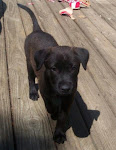It arrived in the mail. Unrequested; unsolicited.
A 7 x 10 envelope screaming THE DOG FOOD BLACKLIST… If you are feeding any of these to your dog—Stop Now and Reconsider! (SEE OTHER SIDE)
Okay. So we turn the envelope over to read:
Warning: Feeding THESE dog foods to your dog could be hazardous to his health!
The canine equivalent of Twinkies (Product named Inside)
The toxic dog chew (Product named inside)
The “real beef” food that’s a real turkey (Product named inside)
The “top dog” of misleading advertising (Product named inside)
INSIDE: Get a FREE COPY of the Special Report many dog food manufacturers hope you’ll never see!
Ordinarily, we are quickly turned-off by so many exclamations and dire bold-face warnings and toss the fear-invoking missive into the trash. But, since it was about dogs, we thought, why not take a look. More to come.
Monday, September 22, 2008
Ordering Pet Products Online
It is one thing to buy pet food and treats in the store where you can actually read all of the ingredients and see where the product is made. But what about shopping online for pet supplies? This is very convenient and you can see varieties not available in a lot of stores. There are a several very reliable sites— www.petfooddirect.com , www.petsmart.com , www.petco.com , to name just a few.
But you mostly are not able to see the country of origin for food or toys—especially worrisome for consumables. For instance, there was a pet chew with the brand name Dingo—you’d think it would be from Australia, perhaps? When it arrived, the package stated the chew came from China. Back it went, maybe not to China, but to the company from whence it came. If the information on the country of origin of this product had been there on the website, the order never would have been placed.
This was mentioned to the company and the reply was something like they didn’t have enough space to put where every product was made. Not much of an excuse, especially considering these bones, chews and treats are going to be given to peoples’ beloved pets, who can’t complain if something they just ate is making them sick. The chances that any of these products could be harmful are probably slim. These are big companies and they know what they re doing for the most part. But putting up a few more lines of text indicating the origin of a product—especially anything to be eaten—seems easy enough. And if they don’t know where these items come from, then shame on them.
But you mostly are not able to see the country of origin for food or toys—especially worrisome for consumables. For instance, there was a pet chew with the brand name Dingo—you’d think it would be from Australia, perhaps? When it arrived, the package stated the chew came from China. Back it went, maybe not to China, but to the company from whence it came. If the information on the country of origin of this product had been there on the website, the order never would have been placed.
This was mentioned to the company and the reply was something like they didn’t have enough space to put where every product was made. Not much of an excuse, especially considering these bones, chews and treats are going to be given to peoples’ beloved pets, who can’t complain if something they just ate is making them sick. The chances that any of these products could be harmful are probably slim. These are big companies and they know what they re doing for the most part. But putting up a few more lines of text indicating the origin of a product—especially anything to be eaten—seems easy enough. And if they don’t know where these items come from, then shame on them.
Labels:
China,
dog toys,
imported food,
online pet stores,
pet food direct,
Pet foods,
pet treats,
petco,
petsmart
Subscribe to:
Comments (Atom)





